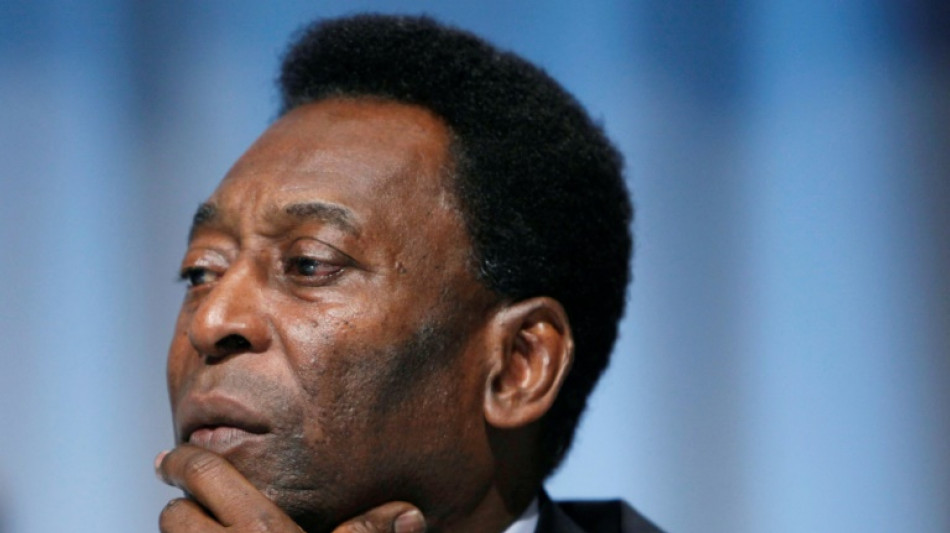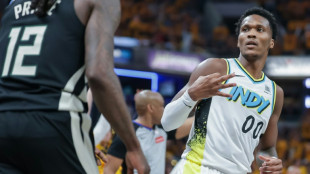
-
 Unbeaten Miami edge Columbus in front of big crowd in Cleveland
Unbeaten Miami edge Columbus in front of big crowd in Cleveland
-
Kim takes one-shot lead over Thomas, Novak at RBC Heritage

-
 Another round of anti-Trump protests hits US cities
Another round of anti-Trump protests hits US cities
-
'So grateful' - Dodgers star Ohtani and wife welcome first child

-
 PSG maintain unbeaten Ligue 1 record, Marseille back up to second
PSG maintain unbeaten Ligue 1 record, Marseille back up to second
-
US, Iran report progress in nuclear talks, will meet again

-
 US Supreme Court intervenes to block Trump deportations
US Supreme Court intervenes to block Trump deportations
-
Hamas armed wing says fate of US-Israeli captive unknown

-
 Pacers thump Bucks to open NBA playoffs
Pacers thump Bucks to open NBA playoffs
-
Sabalenka reaches Stuttgart semis as Ostapenko extends Swiatek mastery

-
 Zelensky says Ukraine will observe Putin's Easter truce but claims violations
Zelensky says Ukraine will observe Putin's Easter truce but claims violations
-
'Fuming' Watkins fires Villa in bid to prove Emery wrong

-
 DR Congo boat fire toll revised down to 33
DR Congo boat fire toll revised down to 33
-
England thrash Scotland to set up France Grand Slam showdown

-
 Verstappen's Red Bull 'comes alive' to claim record pole in Jeddah
Verstappen's Red Bull 'comes alive' to claim record pole in Jeddah
-
McTominay fires Napoli level with Inter as Conte fuels exit rumours

-
 Rajasthan unleash Suryavanshi, 14, as youngest IPL player but lose thriller
Rajasthan unleash Suryavanshi, 14, as youngest IPL player but lose thriller
-
Man City boost top five bid, Aston Villa thrash in-form Newcastle

-
 Villa rout Newcastle to rekindle bid to reach Champions League
Villa rout Newcastle to rekindle bid to reach Champions League
-
Dumornay gives Lyon lead over Arsenal in Women's Champions League semis

-
 Trans rights supporters rally in London, Edinburgh after landmark ruling
Trans rights supporters rally in London, Edinburgh after landmark ruling
-
'We have to wait': Barca's Flick on Lewandowski injury fear

-
 Bordeaux-Begles backups edge Pau to close in on Top 14 summit
Bordeaux-Begles backups edge Pau to close in on Top 14 summit
-
Trans rights supporters rally outside in London, Edinburgh after landmark ruling

-
 PSG beat Le Havre to stay on course for unbeaten Ligue 1 season
PSG beat Le Havre to stay on course for unbeaten Ligue 1 season
-
Man City close in on Champions League with Everton late show

-
 14-year-old Vaibhav Suryavanshi becomes youngest IPL player
14-year-old Vaibhav Suryavanshi becomes youngest IPL player
-
Barca make stunning comeback to beat Celta Vigo in Liga thriller

-
 Zverev sets up birthday bash with Shelton in Munich
Zverev sets up birthday bash with Shelton in Munich
-
Man City boost top five bid, Southampton snatch late leveller

-
 US Supreme Court intervenes to pause Trump deportations
US Supreme Court intervenes to pause Trump deportations
-
Alcaraz and Rune race into Barcelona final

-
 US, Iran to hold more nuclear talks after latest round
US, Iran to hold more nuclear talks after latest round
-
Man City close in on Champions League thanks to Everton late show

-
 Bayern close in on Bundesliga title with Heidenheim thumping
Bayern close in on Bundesliga title with Heidenheim thumping
-
Tunisia opposition figures get jail terms in mass trial

-
 Putin announces 'Easter truce' in Ukraine
Putin announces 'Easter truce' in Ukraine
-
McLaren duo in ominous show of force in Saudi final practice

-
 Afghan PM condemns Pakistan's 'unilateral' deportations
Afghan PM condemns Pakistan's 'unilateral' deportations
-
Iran says to hold more nuclear talks with US after latest round

-
 Comeback queen Liu leads US to World Team Trophy win
Comeback queen Liu leads US to World Team Trophy win
-
Buttler fires Gujarat to top of IPL table in intense heat

-
 Unimpressive France stay on course for Grand Slam showdown
Unimpressive France stay on course for Grand Slam showdown
-
Shelton fights past Cerundolo to reach Munich ATP final

-
 Vance and Francis: divergent values but shared ideas
Vance and Francis: divergent values but shared ideas
-
Iran, US conclude second round of high-stakes nuclear talks in Rome

-
 Dumornay gives Lyon first leg lead over Arsenal in women's Champions League semis
Dumornay gives Lyon first leg lead over Arsenal in women's Champions League semis
-
Trans rights supporters rally outside UK parliament after landmark ruling

-
 Rune destroys Khachanov to reach Barcelona Open final
Rune destroys Khachanov to reach Barcelona Open final
-
From Messi to Trump, AI action figures are the rage


Pele's politics still a touchy subject in Brazil
Pele is revered in Brazil as the eternal "King of Football."
But the legendary player's image is more complicated when it comes to the trickier terrain of politics in his home country, where he faced criticism for his failure to speak out on racism and his supposed closeness with the former military regime.
Widely regarded as the greatest footballer in history, Pele died Thursday at age 82, triggering an outpouring of emotion in Brazil -- and a national reexamination of his legacy.
Pele's surge to global superstardom overlapped with the rise of Brazil's Cold War-era military regime, which ruled the South American country with an iron fist from 1964 to 1985.
The legendary player was photographed rubbing shoulders with the likes of dictators Emilio Garrastazu Medici and Ernesto Geisel, two of the most hardline generals to preside over a regime that killed or "disappeared" hundreds of people.
Clutching his World Cup trophies and grinning alongside the generals, the black footballer also drew criticism for his silence on racism, at a time when Brazil -- the last country in the Americas to abolish slavery -- was presenting itself to the world as a harmonious "racial democracy."
"He acted like a submissive black who accepts everything and fights nothing," fellow player Paulo Cezar Caju, his teammate on Brazil's storied 1970 World Cup-winning squad, once said.
Pele drew fresh criticism when asked about the dictatorship years in a Netflix documentary on his life, released in 2021.
"For me, at least, it changed absolutely nothing," he said. "Football kept going just the same."
In the same documentary, famed Brazilian sports journalist Paulo Cesar Vasconcellos underlines Pele's silence on political issues in those troubled times.
He "accepted the regime, which treated him well because it knew how important he was," Vasconcellos said.
- Lesser-known legacy -
But lesser-known archive photos show a different side of Pele.
In one, he wears a yellow jersey stamped with the phrase "Diretas ja" -- direct elections -- the rallying cry of the anti-government protests that swept Brazil in the 1980s, triggering the dictatorship's downfall.
That 1984 picture appeared on the cover of leading Brazilian sports magazine Placar.
Other images resurfaced during the month Pele spent in hospital before he died, such as a 1989 press conference in which he announced he was thinking of running for president and declared himself a "socialist."
He did not ultimately run, but served as sports minister under center-right president Fernando Henrique Cardoso from 1995 to 1998.
Pele was an assertive, hands-on minister who fought to guarantee footballers' rights at their clubs -- reportedly drawing the ire of the most powerful man in football, fellow Brazilian and then-FIFA president Joao Havelange.
- 'Made me love Brazil' -
Pele defended himself against his critics, saying he preferred to make a subtler statement on issues such as racism.
In comments cited in a 2020 article in Spanish newspaper El Pais, he said he'd been called "monkey" and worse, but that he "didn't care."
"I preferred to set an example for my family and fans. That's my fight."
The same article compared him to American NBA great Michael Jordan, who revolutionized basketball in the 1990s, but who also faced criticism for his perceived failure to take a stand on hot-button topics of the day.
In the Netflix documentary, Pele reminded viewers he had spoken out on issues important to him, such as dedicating his 1,000th career goal in 1969 to Brazilian children suffering from hunger.
"I'm sure I've done more to help Brazil with my football and my way of life than a lot of people who make their living in politics," he said.
And although some criticize him for not speaking out on racism, others say the mere fact of seeing a black man rise to such heights was an inspiration.
"Pele is the first person who made me love Brazil," prominent black intellectual Silvio Almeida -- set to become culture minister under left-wing president-elect Luiz Inacio Lula da Silva -- tweeted after Pele's death.
"Seeing a Brazilian black man like me become the uncontested greatest at what he did made me think we could believe in something."
P.Costa--AMWN



